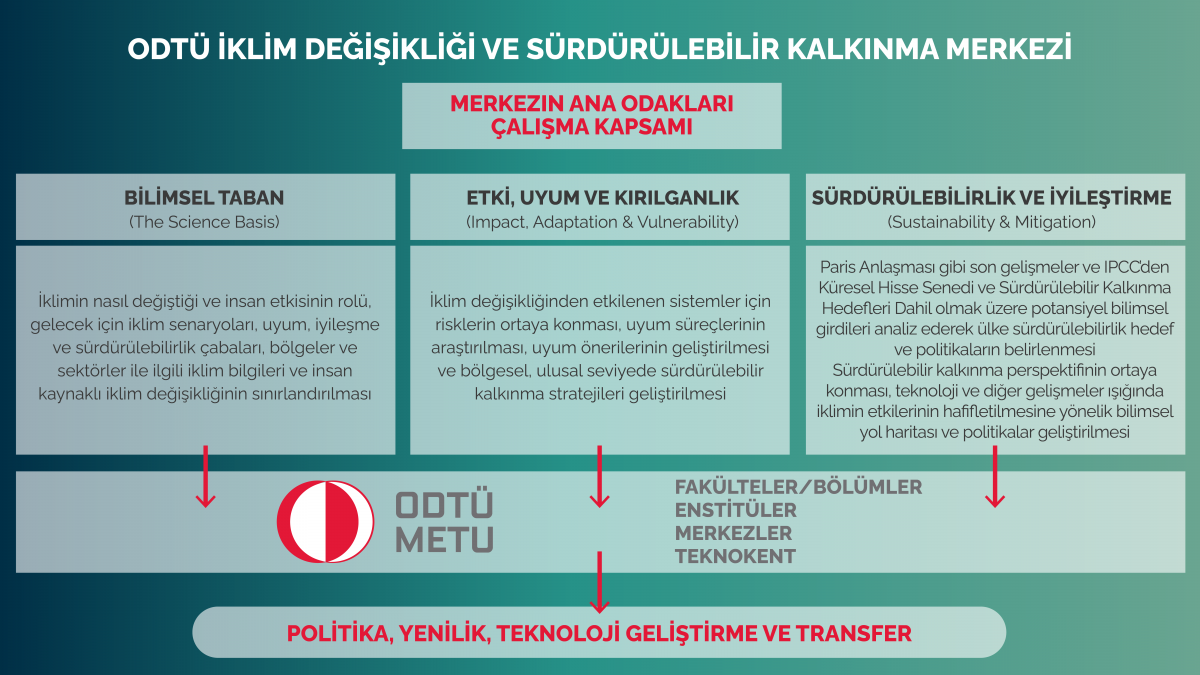Objectives and Main Focuses, Activities
GOALS
Both the society and the physical infrastructures are directly impacted by climate change and its consequences. Mitigating these impacts and ensuring the adaptation of societies and infrastructures to changing environmental conditions and the sustainability of resources is possible only through long-term science-based strategies and policies. The main goal of the METU CLIMATE is to contribute at the national and international levels to the development of scientific, realistic and reliable climate and sustainable development strategies and policies required by our country and society.
The activities to be carried out by the Center include:
-
Researching the mechanisms that determine the resilience or vulnerability of marine, aquatic, and terrestrial ecosystems vis-à-vis climate change, and developing nature-based solutions to boost resilience,
- Developing adaptation and solution proposals against problems caused by climate change,
- Supporting the determination of national contributions to the Paris Agreement,
- Playing a part in the design and implementation of sustainable development governance policies,
- Conducting scientific research and implementation projects on reducing air pollution and greenhouse gas emissions that accelerate climate change,
- Generating projects for the adaptation of the society and infrastructures to changing environmental conditions,
- Creating societal awareness about climate change and its impacts,
- Conducting research and development activities on current and past climate change patterns and providing support for research activities conducted by third parties.
- Training expert, entrepreneurial, and research-oriented human resources,
- Providing physical and technical infrastructure, education and consultancy support for scientific and technological research and development for climate change adaptation and solutions,
- Collaborating with national and international institutions and organizations, and developing projects in the form of universities, public and private sector partnerships,
- Empowering Türkiye to play a leading role in global efforts related to climate change and sustainable development.
FOCUS AREAS
In line with the related objectives, the focus areas of the Center are:
- Scientific Basis: Developing climate scenarios to understand how the climate is changing and the role of human influence, to foresee potential climate futures, and to guide adaptation, mitigation, and sustainability efforts. In collaboration with relevant institutions, building a knowledge base to understand the current state of the climate, including climate data related to regions and sectors.
- Impact, Adaptation and Vulnerability: Identifying risks for systems affected by climate change, researching adaptation processes, developing adaptation proposals and sustainable development strategies at national and regional levels in order to overcome challenges in climate change and sustainability.
- Sustainability and Mitigation: Analyzing potential scientific inputs, including the Paris Agreement and Sustainable Development Goals, and identifying national sustainability goals and policies.
- Policy, Innovation, Technology Development and Transfer: Presenting sustainable development perspectives, creating scientific roadmaps and policies for mitigating the effects of climate change in the light of technological and other developments, and generating innovative solutions towards decarbonization.

EXAMPLES OF ACTIVITIES AT THE NATIONAL LEVEL
To support our country's responsibilities as a signatory to the Paris Climate Agreement, the activities undertaken based on the identified work areas include:
- Contributing to the preparation of reports to be submitted by Türkiye as mandated by international organizations and agreements,
- In line with the national 2053 Net Zero Emission Target, devising policies to fight climate change and enable green development, creating the scientific groundwork for and contributing to the preparation of strategies and action plans,
- Conducting studies to identify the needs for climate change adaptation at national, local, and sectoral levels,
- Conducting modelling and risk assessment studies to identify the effects of climate change and mapping risks,
- Monitoring and assessing local, regional, and national climate change action plans,
- Monitoring and assessing greenhouse gas emissions at the national level,
- Contributing to the development of sectoral policies and strategies on reducing greenhouse gas emissions,
- Conducting research on market-based mechanisms and economic instruments, including emission trading systems,
- Contributing to the preparation of scientific groundwork for emission trading systems and other carbon pricing mechanisms,
- Researching national and international sources of finance required to fight climate change and promote green development, conducting academic research to identify beneficiary stakeholders and develop their capacity,
- Contributing to setting environmental label policies and strategies,
- Supporting efforts for harmonization with European Union acquis,
- Contributing to national and international projects to be developed by ministries,
- Carrying out education and training, capacity-building, and awareness-raising activities for the public.
